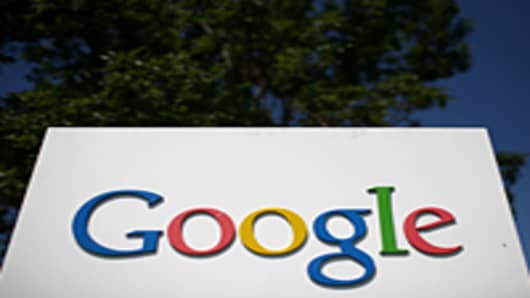Google TV aims to eliminate the line between your computer and your television.
It's designed to allow you to surf a range of websites and access online video from your couch.
Unlike current systems like Tivo's, which allow users to access Netflix streaming through the Internet, this technology would be entirely open.
It'll take some hardware- like a keyboard, and not everyone wants to be an active TV viewer — but imagine having a Google search screen on your TV. And imagine being able to surf between YouTube and your favorite network sitcom. The technology will be available in the fall on Sony televisions and Blu-Ray players as well as a set-top box that will work with existing TVs. So what does this mean for media companies?
If people really can switch seamlessly between web content and the big four networks, then the media giants better take note. Ads are priced for the format in which they run. If content and ads designed for the web are available on your giant flat screen, that'll turn the media model upside down.
ABC, NBC, and FOX charge advertisers with an entirely different standard for spots on shows on Hulu than they do for spots on TV. Ads are priced differently and viewership is measured differently. For media folks, it's apples and oranges — apples and oranges they try to toss together to sell advertisers a package of web and TV spots.
Will media companies try to block users from watching their content on YouTube, Hulu, or CBS.com on their TV sets? Is it inevitable that all content is available anywhere? Is trying to control how consumers watch content a fool's errand?
What will cable companies and cable broadcasters do?
If consumers can access a big chunk of content that cable companies have made available online, on their TV screen, will cable subscribers consider dropping their cable bill? Comcast and Time Warner Cable along with big cable broadcasters like Time Warner have been pushing "TV everywhere" solutions, which allow subscribers to access cable content online behind a password firewall. Will access to that online content on your TV change the way cable giants structure "TV Everywhere"?
Google is hardly the first company to connect your TV to the Internet. Apple's Apple TV failed to take off, though it's a useful tool (I own one) to access iTunes on your TV screen. Roku and Boxee both also sell set-top boxes that allow you to access web content on your TV screen. None of them have become a mass consumer solution.
Yahoo responded to Google's big news about its Google TV product by promoting its own efforts to connect TVs to the Internet. Yahoo reminded me that "Yahoo! Connected TV" allows channel surfers to access Internet content, while watching TV by accessing "TV widgets" with their remote control. I first reported on Yahoo TV when it launched at CES back in 2009; now it has distribution partnerships with 5 TV manufacturers including Sony, Samsung, and LG. If you buy a Yahoo-enabled TV, you can download some fifty widgets. Again, Yahoo hasn't transformed the way people watch TV.
Will Google's new solution?
We'll see this fall.
Questions? Comments? MediaMoney@cnbc.com



